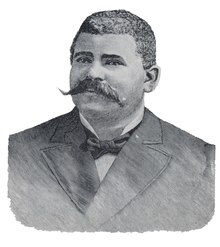
The National Baptist Convention of America International, Inc., more commonly known as the National Baptist Convention of America or sometimes the Boyd Convention, is a Christian denomination based in the United States. It is a predominantly African American Baptist denomination, and is headquartered in Louisville, Kentucky. The National Baptist Convention of America has members in the United States, Canada, the Caribbean, and Africa. The current president of the National Baptist Convention of America is Dr. Samuel C. Tolbert Jr. of Lake Charles, Louisiana.

Union University is a private Baptist Christian university in Jackson, Tennessee, with additional campuses in Germantown and Hendersonville. The university is affiliated with the Tennessee Baptist Convention. It is a union of several different schools: West Tennessee College, formerly known as Jackson Male Academy; Union University of Murfreesboro; Southwestern Baptist University; and Hall-Moody Junior College of Martin, Tennessee.

The Southwestern Baptist Theological Seminary is a Baptist theological institute in Fort Worth, Texas. It is affiliated with the Southern Baptist Convention. It was established in 1908 and in 2005 was one of the largest seminaries in the world. It is accredited by the Association of Theological Schools in the United States and Canada, the Southern Association of Colleges and Schools Commission on Colleges, and the National Association of Schools of Music to award diplomas and bachelor's, master's, and doctoral degrees.
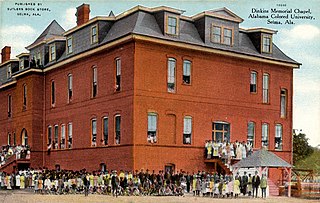
Selma University is a private historically black Baptist Bible college in Selma, Alabama, U.S.. It is affiliated with the Alabama State Missionary Baptist Convention.

Hardin–Simmons University (HSU) is a private Baptist university in Abilene, Texas, United States. It is affiliated with the Baptist General Convention of Texas.

Southeastern Baptist Theological Seminary (SEBTS) is a Baptist theological institute in Wake Forest, North Carolina. It is affiliated with the Southern Baptist Convention. in Wake Forest, North Carolina. It was created in 1950 to meet a need in the SBC's East Coast region. It was voted into existence on May 19, 1950, at the SBC annual meeting and began offering classes in the fall of 1951 on the original campus of Wake Forest University in Wake Forest, North Carolina. The undergraduate program is called The College at Southeastern. The current president is Daniel L. Akin.
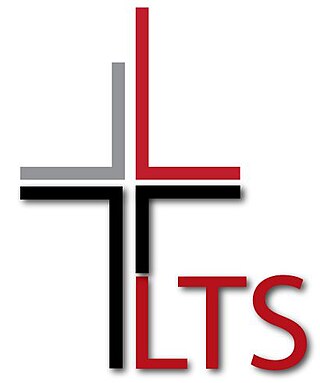
Lexington Theological Seminary is a private Christian seminary in Lexington, Kentucky. Although it is related to the Christian Church, it is intentionally ecumenical with almost 50 percent of its enrollment coming from other denominations. Lexington Theological Seminary is accredited by Association of Theological Schools in the United States and Canada to award Master of Divinity, Master of Theological Studies, Master of Pastoral Studies, and Doctor of Ministry degrees.

Clear Creek Baptist Bible College (CCBBC) is a private Baptist Bible college in Pineville, Kentucky. It is affiliated with the Kentucky Baptist Convention. CCBBC provides a Bible-based education focusing on Christian service. The college is accredited by the Commission on Colleges of the Southern Association of Colleges and Schools and the Association for Biblical Higher Education. CCBBC was founded by Lloyd Caswell Kelly in 1926.

William J. Simmons was an American Baptist pastor, educator, author, and activist. He was formerly enslaved person, who became the second president of Simmons College of Kentucky (1880–1890), for whom the school was later named.
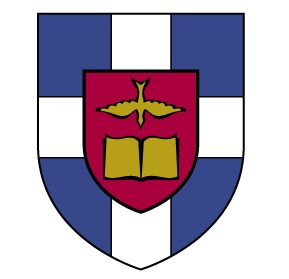
The Southern Baptist Theological Seminary (SBTS) is a Baptist theological institute in Louisville, Kentucky. It is affiliated with the Southern Baptist Convention. The seminary was founded in 1859 in Greenville, South Carolina, where it was at first housed on the campus of Furman University. The seminary has been an innovator in theological education, establishing one of the first Ph.D. programs in religion in the year 1892. After being closed during the Civil War, it moved in 1877 to a newly built campus in downtown Louisville and moved to its current location in 1926 in the Crescent Hill neighborhood. In 1953, Southern became one of the few seminaries to offer a full, accredited degree course in church music. For more than fifty years Southern has been one of the world's largest theological seminaries, with an FTE enrollment of over 3,300 students in 2015.

Boyce College is a private, Christian college located in the Crescent Hill neighborhood of Louisville, Kentucky. It is affiliated with the Southern Baptist Theological Seminary. It receives its accreditation from the Southern Association of Colleges and Schools and the Association of Theological Schools in the United States and Canada.
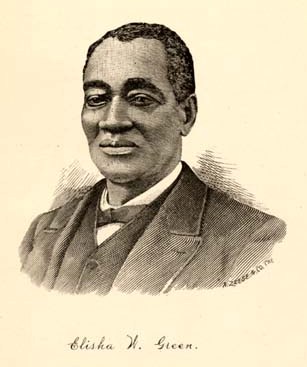
Elisha Winfield Green was a former slave who became a Baptist leader in Kentucky, US. For five years he was moderator of the Consolidated Baptist Educational Association, and he promoted the establishment of what is now the Simmons College of Kentucky. Green suffered from racial intolerance all his life. In 1883, when he was an elderly and respected minister, he was assaulted and beaten for failing to comply with a demand to give up his seat on a train.

Mary Virginia Cook Parrish taught, wrote and spoke on many issues such as women's suffrage, equal rights in the areas of employment and education, social and political reform, and the importance of religion and a Christian education. She was at the founding session of the National Association of Colored Women in 1896 at the 19th Street Baptist Church in Washington D.C. She was an early proponent of Black Baptist feminism and founder of the National Baptist Women's Convention in 1900.
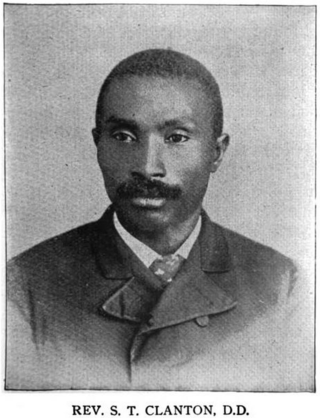
Solomon T. Clanton was a leader in the Baptist Church. He was educated in New Orleans and Chicago and became the first black graduate of the theological department at the Baptist Union Theological Seminary at Morgan Park, Chicago, Illinois, associated with the University of Chicago. He spent his career as an educator and leader in the Baptist Church. He served as a professor at Leland University, Alabama A&M University, and Selma University, and before his death as assistant librarian at the University of Chicago. He was acting president for a short time at Alabama A&M and was dean of the theological department at Selma University. During his career, he was also an educator in high schools and Sunday schools.
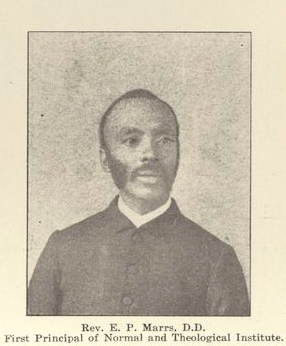
Elijah P. Marrs was a minister and educator in Louisville, Kentucky. He was a sergeant in the 12th Regiment Heavy Artillery U.S. Colored Troops during the American Civil War (1861–1865). After the war he taught in various schools and helped organize Loyal Leagues to defend blacks from attacks by the Ku Klux Klan. Together with his brother, Henry, he helped found what became Simmons College of Kentucky in Louisville in 1879.

William Henry Steward was a civil rights activist from Louisville, Kentucky. In February 1876, he was appointed the first black letter carrier in Kentucky. He was the leading layman of the General Association of Negro Baptists in Kentucky and played a key role in the founding of Simmons College of Kentucky by the group in 1879. He continued to play an important role in the college during his life. He was also co-founder of the American Baptist, a journal associated with the group, and Steward went on to be the journal's editor. He was a leader in Louisville civic and public life, and played a role in extending educational opportunities in the city to black children. In 1897, his political associations led to his appointment as judge of registration and election for the Fifteenth Precinct of the Ninth Ward, overseeing voter registration for the election. This was the first appointment of an African American to such a position in Kentucky. He was elected president of the Afro-American Press Association in the 1890s He was a close associate of Booker T. Washington, and in the late 1890s and early 1900s, Steward was a prominent member of the National Afro-American Council, which was dominated by Washington. He was president of the council from 1904 to 1905. He was a lifelong opponent of segregation and was frequently involved in anti-Jim Crow law activities. In 1914 he helped found a Louisville branch of the National Association for the Advancement of Colored People (NAACP), which he left in 1920 to become a key player in the Commission on Interracial Cooperation (CIC). He was also a prominent freemason and twice elected Worshipful Master of the Grand Lodge of Kentucky.
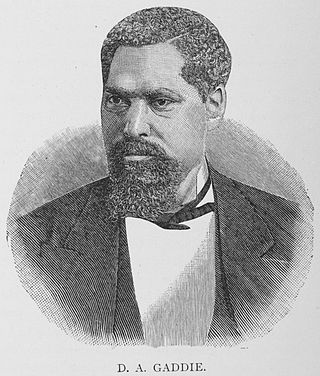
Daniel Abraham Gaddie was a Baptist preacher in Louisville, Kentucky. He was known for his leadership in state and national Baptist organizations.

MatthewCampbell, or Madison Campbell, was a Baptist preacher in Richmond, Kentucky. He was a local religious and political leader and helped organize a number of churches.

Charles Henry Parrish was a minister and educator in Lexington and Louisville, Kentucky. He was the pastor at Calvary Baptist Church in Louisville from 1886 until his death in 1931. He was a professor and officer at Simmons College, and then served as the president of the Eckstein Institute from 1890 to 1912 and then of Simmons College from 1918 to 1931. His wife, Mary Virginia Cook Parrish and son, Charles H. Parrish Jr., were also noted educators.

Artishia Garcia Gilbert (1868–1904) was an African American physician who was likely the first African American woman licensed to practice medicine in the U.S. state of Kentucky. After earning her undergraduate and master's degrees in Kentucky, Gilbert earned her medical degree in Washington, D.C. While continuing her education, Gilbert taught at her alma mater and upon obtaining her license both continued to teach and practiced medicine in Louisville.

